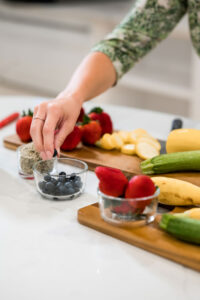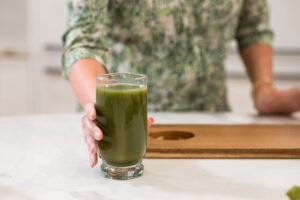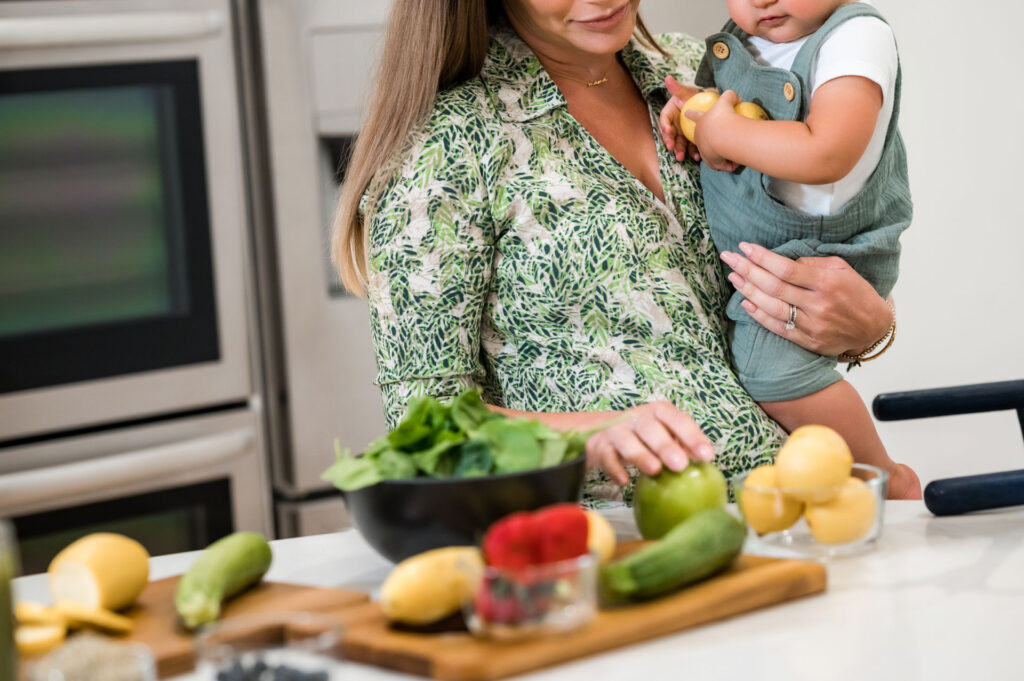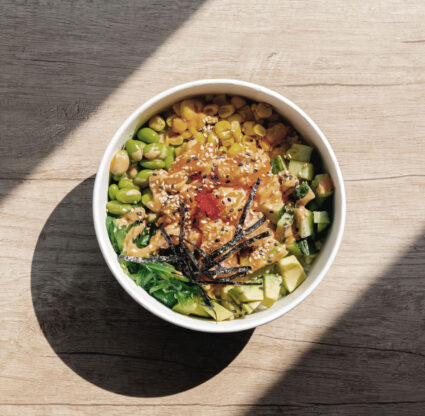After having her first baby in 2022, certified holistic nutritionist Jennifer Khosla saw the world differently. Physically, she felt stronger than ever; within, she sensed a softening. The entrepreneur’s consistent drive to do more had lost its luster. Welcoming her second child, a girl, last fall sealed the deal. “Having my two babies back to back was such an invitation to slow down and focus on things I would overlook before,” she says.
The Florida native spent nearly a decade building her Lean and Green Body empire, which included fitness and yoga training, nutritional coaching, brand collaborations, managing a team, and creating a steady stream of content for her thousands of blog and social media followers.

She’s since dissolved the company and rebranded under her name. Her mission is laser-focused now, too: she wants to help fuel, heal and nourish feminine energy. Knowing the barrage of nutritional research can be overwhelming, she aims to streamline information for women into actionable takeaways. “It’s all very complex, but it doesn’t have to be,” she says. “I’ve done eight years of post-grad schooling to get here. Once you have the foundation, you can go through the science easier and simplify it.”
Naturally, while she’s in her self- described #momera, Jennifer hones in on nutrition for mothers pre-, during- and post-pregnancy. This summer, she launches a few e-books with recipes geared around healthy eating for women and babies (as they’ve introduced solid foods into the kids’ breastfed diet, she and her husband have made all foods—even bars, frozen pops and snacks—for their 2-year-old son, Bodhi, and 9-month-old, Suri). She offers all her insights and resources for free through her Instagram and e-books.
At the core of strong female nutrition, Jennifer stresses eating for hormone health. “I struggled with fertility for years before I became pregnant with my son, not realizing how many endocrine disruptors are in everyday products and how big of an issue it is,” she says.

And, it’s not just what you put into your body. “Hormone disruptors can be found in everything from our makeup to our snacks and even our cleaning supplies and laundry detergent,” she says. (Look out for ingredients like phthalates; compounds with ‘parabens’ in the name, which are said to mimic estrogen; and anything with ‘fragrance,’ a protected trade-secret ingredient that can hide a litany of chemicals.)
On the nutritional side, Jennifer knows women need protein, complex carbs and healthy fats, along with higher doses of certain micronutrients like magnesium, B vitamins, omega-3 fatty acids and vitamin D to balance the endocrine system. Fiber is also crucial, since it helps remove excess hormones and toxins from the body and increases feelings of fullness.
Her ideal diet includes plenty of whole fruits and vegetables; fibrous legumes and nuts; omega-heavy avocado, flaxseeds and salmon; vegan (or lean, grass-fed proteins, if you eat meat); and no processed or refined foods. “Produce that’s herbicide- and pesticide-free is also more nutrient-dense, so you don’t need as much of it to meet your nutritional needs,” she says.
Perfection is not the goal—she supports incremental change and making small tweaks that can make you start feeling better right away, like drinking more water. “Our bodies work so hard when we sleep—start by drinking 8 ounces of room temperature water when you wake up,” she says. “Second: Get outside and get sunlight first thing to wake up the body and regulate your system.”

Jennifer likes to layer superfoods into her recipes, with nutrient-rich maca, fibrous hemp hearts and spirulina, which is said to help with PMS symptoms. She shuns refined carbs (white pasta, white bread)—these are linked to decreased glucose and exacerbated mood and fatigue issues—in favor of complex carbs like starchy and root vegetables, and, her favorite, quinoa.
The Springfield College Boston athletic training and nutrition-grad stresses the importance of protein as a building block for estrogen. The recommended dose changes for every body and level of activity. On average, experts suggest .8-1 grams a day per kilogram of body weight, and recent studies say plant proteins are most beneficial. Spread out your legumes, nut butters and other protein sources among your daily meals for sustained energy. And, always balance it with high-quality vegetables, fruits and healthy fats, like avocado and salmon (omegas and other healthy fats are also hormonal powerhouses).
Jennifer and her family make much of what they eat from scratch. Date nights with her husband, Ricky—an engineering supervisor at Arthrex—often involve cooking classes, and she’s loved seeing Bodhi get involved, too. The toddler hops on his kitchen tower and hands her fruits and veggies for juicing, helps make bread and homemade butter, and taste-tests his favorite muffins, reinforced with leftover carrot-juice pulp. “He knows all the ingredients and the 2-year-old version of ‘why we use them,’” she says.
Cooking feeds the slower, more mindful lifestyle Jennifer has adopted—a big shift from her entrepreneurial, boss-lady days. But, success looks different to the 38-year-old today. A productive day now means preserving her energy (she surrounds herself with as many positive people and situations as possible), spending time with her family and helping other women learn how to best nourish themselves. “Most people have no idea how amazing their body is naturally designed to feel,” she says. “People don’t have to live fatigued, overweight, bloated, constipated, or with heartburn, IBS, brain fog, anxiety—I want women to understand how amazing they can feel—how energized, how much peace they can feel.”

JENNIFER’S NOURISHING TIPS
Hormone health is at the core of female wellness, and your foods play a major role.
FEED YOUR ENDOCRINE SYSTEM
“Focus on eating real, whole foods in their natural state and consuming enough protein, healthy fats and fiber,” Jennifer says. She advocates for plates of vegan proteins, omega-rich salmon, whole grains, and tons of raw leafy greens and fruits and vegetables. Unless advised by your doctor, avoid strict diets that severely limit or increase calories, carb, protein or healthy-fats—your system can go haywire as hormones try to compensate. Jennifer likes protein shakes for a cooling, hormone-healthy snack: “I love a clean vegan protein powder, MALK Organics nut milk, mixed with some healthy fats, greens and berries.”
REGULATE YOUR NERVOUS SYSTEM
A stressed body—whether from poor diet, illness or physical chronic stress—prioritizes survival over reproductive functions (everything from actual baby-making systems to PMS and menopause to your daily mood, weight management and stamina), causing a slew of mild-to-severe symptoms. “Energy is everything,” she says. “I try to surround myself with positive uplifting people as much as I can.”
REASSESS AS YOU AGE
Nutrition needs change with shifting hormone levels. Limit alcohol, refined carbs and processed sugar always, but especially if you’re trying to conceive and preserve hormone health in your 20s and 30s. Increase protein in your mid-30s and 40s, when muscle mass starts to decrease and body fat and glucose creep up (why women start to see weight gain even though their habits don’t change). Protein is closely linked with neurotransmitters related to mood and motivation, so it’ll feed your mind, too. As you move into menopause, protein needs increase—especially post-workouts for muscle growth—along with calcium and vitamin D to preserve bone health as estrogen dips. “If we follow our hormones and our menstrual cycles, it can be a really great guide,” she says.
USE FOOD TO COPE
For PMS-related irritability and energy issues, she suggests eating foods high in calcium (shown to reduce fatigue, cravings and depression) and B vitamins (especially B6 for mood; try kale and bananas). Reducing bloating salt and caffeine—which can exacerbate stomach and sleep disruptions (have antioxidant-rich matcha, instead, she says)—will help, and zinc-rich beans can soothe cramps. During menopause, peppermint and chamomile tea and ginkgo Biloba are said to aid with hot flashes, mood swings and sleepless nights.
TAKE YOUR VITAMINS
Jennifer’s a fan of supplements, including nonsynthetic, whole-foods multivitamins and probiotics. “It’s rare that people are actually getting every vitamin and mineral from their diet,” she says. She boosts her intake with vitamin C (“Every organ in our body needs it—not just our immune system—and it can help with so much, including fertility,” she says.) and magnesium (the World Health Organization says most Americans are deficient). But, a clean, balanced diet is your backbone.
GIVE YOURSELF A BREAK
PMS, postpartum, menopause—they’re all normal stages. Above all, Jennifer wants women, especially new mothers, to focus on fueling their bodies, not watching a scale. “This time is not about bouncing back or focusing on weight loss—it’s about healing and nourishing yourself and your new baby,” she says. “Taking care of ourselves is so crucial. We can’t properly take care of anyone else unless we are taking care of ourselves.”

Photography by Anna Nguyen




